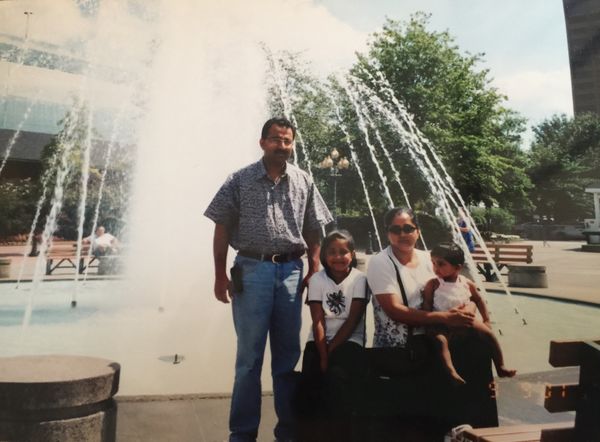
 No one chooses to become a refugee. To flee one’s home and traditions to the uncertainty of a different country is against human nature, itself, and those who seek this path as a refugee have no other choice. The UN Convention itself states that a refugee is"‘someone who’s unable to return to their country." They fear that their rights as a human being will be violated if they return to their countries of origin and have no alternative but to leave everything behind and flee their home.
No one chooses to become a refugee. To flee one’s home and traditions to the uncertainty of a different country is against human nature, itself, and those who seek this path as a refugee have no other choice. The UN Convention itself states that a refugee is"‘someone who’s unable to return to their country." They fear that their rights as a human being will be violated if they return to their countries of origin and have no alternative but to leave everything behind and flee their home.
A refugee is ‘someone who is unable or unwilling to return to their country of origin owing to a well-founded fear of being persecuted for reasons of race, religion, nationality, membership of a particular social group, or political opinion’
- UN Convention on refugees
From the past five years and on, the world has a growing refugee crisis that now extends to 19.5 million people trying to reach sanctuary  abroad. With multiple crises brewing up in the Middle East and Africa in addition to the Syrian Republic critical situation, the number of forced displacement of people grew exponentially in the past three years, a 40 percent rise according to UNHRC.
abroad. With multiple crises brewing up in the Middle East and Africa in addition to the Syrian Republic critical situation, the number of forced displacement of people grew exponentially in the past three years, a 40 percent rise according to UNHRC.
This increasing rate of displaced people made developed countries try to shut their border and take "Deterrence Tactics" to avoid the problem and conveniently leave developing countries and overwhelmed humanitarian agencies to host and help more than 80 percent of all refugees. Xenophobia is a major factor in most of those cases, and European nationality has been growing due to this fear of the foreign.
Besides obnoxious border control practices that keep people from a relatively physical security, countries are now looking for legal deterrent schemes to put in practice against refugees. In January 2016, both Swiss and Danish government approved a law to seize refugee’s valuable assets to cover the costs of them seeking help there. The news of inhuman treatment of refugees from Denmark and Switzerland spread fast, and refugees try to look elsewhere for asylum.
This is not the right solution to the problem of millions of displaced people seeking security from mass crimes, war and rapes. This new law sparked, rightly so, an outrage from the global community, but many of the deterrent practices still go unnoticed by the citizens of the world, in particular against the refugees from African countries like Eritrea.
The Eritrean conflict has been going many years before the Syrian refugee crisis sparked in 2015, and the United Nations Human Rights Council established a Commission as early as 1991 to investigate violations of human rights in Eritrea, with crimes as serious as torture, violations during compulsory national service and extrajudicial killings and abductions. People have been fleeing Eritrean dictatorial rule for more than a decade trying to seek asylum in Ethiopia, Sudan, Israel and European countries, especially in the UK.
In desperation to back away from all this crime and violence that came with the dictatorial political part y in power, Eritreans take dangerous routes with deserts and neighboring warring countries to find protection mostly in Sudan and Ethiopia, plus many that come to Europe through the Mediterranean deadly seas. Many can’t even make it to Europe due to the dangerous trip, but the alternative is to be oppressed and scared in “Africa’s North Korea,” a nickname based on lack of civil liberties this government has imposed since it started in 1991.
y in power, Eritreans take dangerous routes with deserts and neighboring warring countries to find protection mostly in Sudan and Ethiopia, plus many that come to Europe through the Mediterranean deadly seas. Many can’t even make it to Europe due to the dangerous trip, but the alternative is to be oppressed and scared in “Africa’s North Korea,” a nickname based on lack of civil liberties this government has imposed since it started in 1991.
Developed countries were receptive to the Eritreans that found themselves there in previous years of the Eritrean crisis. Those were the years where compassion was greater than fear.
This receptiveness changed with the recent refugee crisis development and refugee’s number boost in the past few years. In December 2014, the Danish Immigration Service released an Immigration Report on Eritrea that suggested that the same authoritarian government is working towards change in the abusive national conscription program.
Human Rights Watch pointed out how deeply flawed the report was, since the specialists writing it just interviewed members of the government itself and anonymous diplomats, thus ignoring the cries of thousands of forcibly displaced people witnesses of the human rights violations.
Despite the multiple contradictory statements and the highly contested Report, Danish government still used it as an argument to deny asylum to the Eritrean refugees ever since it was published, with the UK following it. This Danish Report has been used by developed countries to deny refugee status for displaced Eritrean, and they're often deported because of it.
Even as a UN report from June 2015 states that people returning to Eritrea are often arrested and tortured in infamous prisons, the practice since last year was to reject Eritrean asylum seekers more quickly using this unclear report. This adjustment ended up plummeting the 73 percent approval rate of Eritreans granted protection in the UK in the first quarter of 2015 to a shocking 34 percent in the second quarter. According to Dr. John Campbell, a specialist in anthropology in Africa and Law at the University of London, “(The Home Office) based on a highly selective use of information and it deliberately distorts information to support its own conclusions.”
prisons, the practice since last year was to reject Eritrean asylum seekers more quickly using this unclear report. This adjustment ended up plummeting the 73 percent approval rate of Eritreans granted protection in the UK in the first quarter of 2015 to a shocking 34 percent in the second quarter. According to Dr. John Campbell, a specialist in anthropology in Africa and Law at the University of London, “(The Home Office) based on a highly selective use of information and it deliberately distorts information to support its own conclusions.”
This distortion of the situation in Eritrea by the UK Home Office is one of the many deterrence tactics used by governments to mistreat Eritrean refugees: Sudanese government deported at least 2000 Eritreans back to their home country without allowing them full International Rights early 2016 and European governments are strictly tightening their border control practices. Countries like Denmark, UK, Switzerland, Sudan and Israel choose to deny refugees coming in by either forcibly deporting them or by mistreating them to the point where even their jewelry is confiscated to cope with the costs of having them there.
Developed countries, especially in Europe, are choosing to apply all these inhuman practices rather than working together with other countries to end this refugee crisis. This needs to stop.
Developed countries need to be concerned with finding solutions to the refugee crises rather than wasting efforts with new ways to close borders. There's no easy solution to the multiple refugee crises around the world, but shutting off your country to them and washing your hands away of responsibility is no right way to deal with this.





















